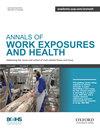137a - Breathe freely initiative to prevent occupational lung disease – Canadian and US rollout
IF 1.8
4区 医学
Q3 PUBLIC, ENVIRONMENTAL & OCCUPATIONAL HEALTH
引用次数: 0
Abstract
Breathe Freely is a British Occupational Hygiene Society (BOHS) initiative aimed at reducing occupational lung disease in the UK, which causes significant debilitating ill-health and an estimated 13,000 deaths per year in the UK. Breathe Freely is about raising awareness of both the problem and how to do something about it: we can protect workers’ health and prevent most of these diseases and deaths. It is not just “the right thing to do”, it is good for business as well. Broad acceptance of this fundamental concept is part of the solution. Thanks to the support and collaboration of the BOHS, both the AIHA construction committee (US) and CRBOH (Canada) have taken steps to introduce Breathe Freely in their respective countries. This session will delve into the core objectives of Breathe Freely and provide updates on its implementation progress in Canada and the United States.137a - 预防职业性肺病的 "自由呼吸 "倡议 - 在加拿大和美国推广
自由呼吸 "是英国职业卫生协会(BOHS)发起的一项倡议,旨在减少英国的职业性肺部疾病。自由呼吸 "旨在提高人们对这一问题的认识,以及如何解决这一问题:我们可以保护工人的健康,预防大多数此类疾病和死亡。这不仅是 "正确的做法",对企业也有好处。广泛接受这一基本概念是解决方案的一部分。得益于 BOHS 的支持与合作,美国 AIHA 建筑委员会(美国)和加拿大 CRBOH 都已采取措施,在各自国家引入 "自由呼吸 "理念。本次会议将深入探讨 "自由呼吸 "的核心目标,并介绍其在加拿大和美国的最新实施进展。
本文章由计算机程序翻译,如有差异,请以英文原文为准。
求助全文
约1分钟内获得全文
求助全文
来源期刊

Annals Of Work Exposures and Health
Medicine-Public Health, Environmental and Occupational Health
CiteScore
4.60
自引率
19.20%
发文量
79
期刊介绍:
About the Journal
Annals of Work Exposures and Health is dedicated to presenting advances in exposure science supporting the recognition, quantification, and control of exposures at work, and epidemiological studies on their effects on human health and well-being. A key question we apply to submission is, "Is this paper going to help readers better understand, quantify, and control conditions at work that adversely or positively affect health and well-being?"
We are interested in high quality scientific research addressing:
the quantification of work exposures, including chemical, biological, physical, biomechanical, and psychosocial, and the elements of work organization giving rise to such exposures;
the relationship between these exposures and the acute and chronic health consequences for those exposed and their families and communities;
populations at special risk of work-related exposures including women, under-represented minorities, immigrants, and other vulnerable groups such as temporary, contingent and informal sector workers;
the effectiveness of interventions addressing exposure and risk including production technologies, work process engineering, and personal protective systems;
policies and management approaches to reduce risk and improve health and well-being among workers, their families or communities;
methodologies and mechanisms that underlie the quantification and/or control of exposure and risk.
There is heavy pressure on space in the journal, and the above interests mean that we do not usually publish papers that simply report local conditions without generalizable results. We are also unlikely to publish reports on human health and well-being without information on the work exposure characteristics giving rise to the effects. We particularly welcome contributions from scientists based in, or addressing conditions in, developing economies that fall within the above scope.
 求助内容:
求助内容: 应助结果提醒方式:
应助结果提醒方式:


